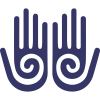What is Parasitic Tension?
The term comes from the Feldenkrais Method, which is a movement awareness practice. Parasitic tension refers to the extra muscle tensing that happens beyond what’s needed for a specific movement. Imagine you’re reaching for a glass of water. Your arm muscles will naturally contract to lift the glass, but you might also unconsciously clench your shoulders or tighten your bottom. This extra tension is parasitic – it doesn’t contribute to the task at hand and can even make it harder.
In another common example, a person working at computer needs to move only their fingers and wrists. However, the stress of the work will often cause the shoulders, neck, or jaw to become tense as well.
Why Does It Matter?
Excess tension on the computer or in any other activity is unlikely to cause any discomfort over the course of a minute or two, but accumulated over the course of days, weeks and years, the effects may become significant.
- Reduce efficiency: Extra tension uses up energy that could be better directed towards the task at hand.
- Lead to pain: Chronically tight muscles can become achy and sore.
- Limit your movement: Unnecessary tension restricts your range of motion.
- Increase stress: Feeling tense can contribute to anxiety and overall stress levels.
The key to tackling parasitic tension is awareness.
Here are some signs to watch for:
- Tightness in your shoulders, neck, or jaw
- Holding your breath during exertion
- Clenching your fists
- A general feeling of being wound up
The good news is that parasitic tension can be addressed. Yoga is a great awareness practice that can highlight and also help release tension. In my classes we do body scans and mindful movement. We stretch and roll, reach and twist. We make ourselves big and small, we do self massage and we also rest.
You can find my classes online and in Streatham.
Join me!



